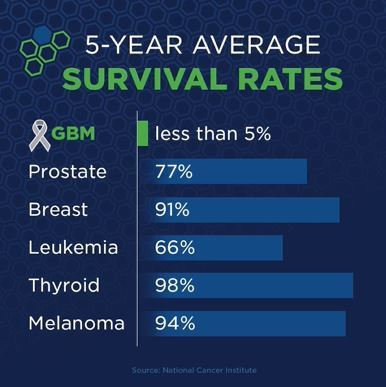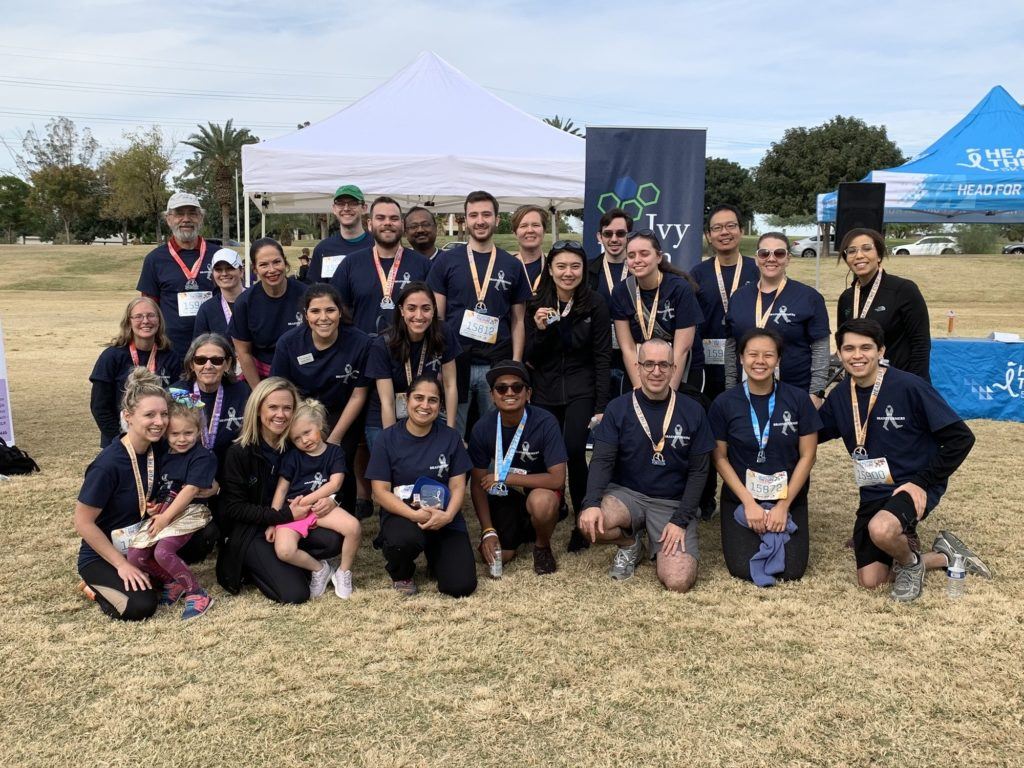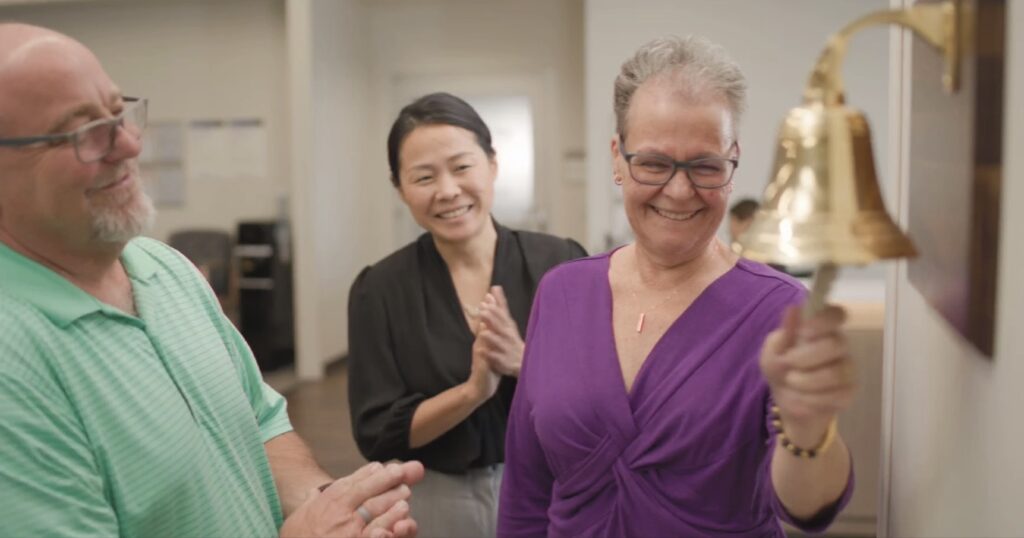
Ivy Blog
Making a Difference on Glioblastoma Awareness Day 2024
- July 1, 2024
- Ivy Center
- Posted in Events
- Comments: 2

What is Glioblastoma Awareness Day?
Glioblastoma Awareness Day (GBM Day) is dedicated to increasing public awareness of glioblastoma, the most common and aggressive form of brain cancer. It also honors those who have been impacted by the disease and supports efforts to develop better treatment options that will improve patients’ long-term prognoses.
U.S. Senator for Arizona, John McCain, died of glioblastoma nearly six years ago on August 25, 2018. Following his death, a bipartisan group of U.S. senators sponsored a resolution to allocate a day in July to raise awareness and leverage support for the research and treatment of glioblastoma. On June 13, 2024, the U.S. Senate unanimously passed the resolution designating July 17, 2024, as Glioblastoma Awareness Day.
When is Glioblastoma Awareness Day?
Glioblastoma Awareness Day (GBM Day) occurs each year on the third Wednesday of July. The sixth annual Glioblastoma Awareness Day will take place on Wednesday, July 17, 2024.
Initially introduced to the Senate by a bipartisan group of U.S. senators, the inaugural Glioblastoma Awareness Day occurred on July 17, 2019.
The response was overwhelming, with scores of individuals and families contributing to the Glioblastoma Awareness Day campaign, enabling the Barrow Neurological Foundation to raise a grand total of $539,044. The first year’s success encouraged those same leaders to come together again to show their unwavering support to move the needle on brain tumor research.
Which U.S. Senators sponsored the original resolution to establish Glioblastoma Awareness Day?
- Senator Lindsey Graham
- Senator Kyrsten Sinema
- Senator Martha McSally
- Senator Elizabeth Warren
- Senator Mitch McConnell
- Senator Ed Markey
Why was Glioblastoma Awareness Day established?
While glioblastoma is considered one of the deadliest forms of brain cancer, with a median survival rate of 15 months, it is also considered a rare disease, with approximately 14,000 new diagnoses each year in the United States. Because of this, it hasn’t received the same national attention or industry interest as many other more prevalent cancer types.
In recent years, however, the passing of high-profile individuals such as Senators John McCain, Ted Kennedy, and Beau Biden has finally put a proper spotlight on the disease. The brain cancer community is ready for a change, and with rapid advancements in technology and the development of novel research methods, the ability to fight this disease with new treatment options has never been more attainable.
What is the brain cancer community doing to improve treatment options for glioblastoma?

The lack of new treatments for aggressive brain tumors requires a bold approach to rapidly identify new, effective therapies that will increase life expectancy and contribute to a cure.
The Ivy Brain Tumor Center is confronting these challenges patient-by-patient through the world’s largest Phase 0 clinical trials program. This approach reduces the obstacles industry and drug development face and uses precision medicine to get new drugs to patients in a fraction of the time and cost associated with conventional clinical trials.
To learn if you or a loved one may be eligible for a Phase 0 clinical trial, please contact an Ivy Navigator at 602-406-8605 or submit a Trial Screening request here.
Part of the reason new drugs have yet to emerge for glioblastoma in over three decades is that the vast majority are incapable of crossing the blood-brain barrier and getting to the tumor. Each new Phase 0 study at the Ivy Center offers another avenue of hope for identifying a therapy that will increase life expectancy for glioblastoma and contribute to a cure.
Nader Sanai, MD
Director, Ivy Brain Tumor Center
How can I get involved on GBM Day?
The need for more awareness, new therapeutic options, and, ultimately, a cure for glioblastoma is greater than ever. Here are a few ways you can make an impact:
Join the #GBMDay movement
Social media is valuable for spreading awareness, promoting unity, and driving action around a movement. The official hashtag for Glioblastoma Awareness Day is #GBMDay.
- Follow the hashtag #GBMDay
- Like and share posts using the hashtag #GBMDay
- Listen to and share a brain tumor podcast, such as the ones listed below:
- Share information and facts about glioblastoma
- Honor a friend or family member impacted by glioblastoma
- Tell the stories of those affected by the disease and the harsh reality that brain cancer can impact anyone, even healthy adults
- Highlight how strong and resilient glioblastoma patients and caregivers are because of their journey
- Recognize doctors, nurses, scientists and advocates who are working tirelessly to defeat this disease
- Follow brain tumor organizations fighting year-round for change:
- American Brain Tumor Association (ABTA)
- Ben and Catherine Ivy Foundation
- EndBrainCancer Initiative
- Glioblastoma Foundation
- Glioblastoma Research Organization
- Gray For Glioblastoma
- Gray Matters Foundation
- Head for the Cure
- International Brain Tumor Alliance (IBTA)
- Musella Foundation
- National Brain Tumor Society (NBTS)
- OurBrainBank
- Pediatric Brain Tumor Foundation
- Society for Neuro-Oncology
- StacheStrong
- St. Baldrick’s Foundation
- Students Supporting Brain Tumor Research
- Rally Foundation
Share your glioblastoma story
At the Ivy Brain Tumor Center, we believe in the power of personal stories. Whether you’re a patient, survivor, caregiver, or loved one affected by brain cancer, sharing your experience can profoundly impact others. Your journey can offer hope and inspiration to those newly diagnosed or currently undergoing treatment. By sharing your story, you provide comfort and encouragement, helping others feel less alone in their struggles.
If you are interested in sharing your story and making a difference in the lives of others, please contact our Communications Specialist, Jennifer Keeler, at jennifer.keeler@ivybraintumorcenter.org.
Please note that your story will only be shared with your express authorization. We are here to amplify your voice and support you every step of the way.
Register for a brain tumor fundraising event

Community events bring people together and provide a supportive setting for individuals who are facing similar challenges. Many of these events are designed to help raise awareness, promote unity and drive action toward discovering new and alternative therapeutic options for brain cancer.
The mission of Head for the Cure is to inspire hope for the brain tumor community while simultaneously celebrating their courage, spirit and energy. Through various fundraising efforts, including 5K events hosted across the country, Head for the Cure is able to support clinical research and patient programs at local brain cancer institutions.
The Ivy Brain Tumor Center is the local beneficiary of the Phoenix Head for the Cure 5K. Click here to join the Phoenix event. This year, the event will take place in person with an option to attend virtually so you don’t have to be local to participate.
Support a brain tumor organization or research program financially
Donations and investments in the education and research of glioblastoma are essential to the progress of defeating this disease.
By donating to the Ivy Brain Tumor Center, 100% of your tax-deductible donations support the operation of clinical research studies that aim to defeat this disease once and for all. Additionally, gifts also provide patient education and enhanced patient care.
You can also make a huge difference by making a donation to a nonprofit organization that helps support families affected by a brain tumor diagnosis like Gray Matters Foundation, Brain Tumor Network, and the EndBrainCancer Initiative.
Advocate for change
As the largest funder of brain tumor research, the federal government plays a pivotal role in the research that will lead to new treatments for glioblastoma. Ask your members of Congress to prioritize medical research for the brain tumor community by taking action now.
In Every Trial, There’s a Path to Triumph
Clinical trials offer brain tumor patients options, often when they have been told there are none. Still, many patients don’t know that clinical trials may be available to them. Despite the potential benefits, only about 8–11 percent of glioblastoma patients participate in a clinical trial.
At the Ivy Brain Tumor Center, we’re confident that accelerated clinical trials will lead to breakthroughs in brain cancer research and care. Here, every challenge faced is an opportunity for innovation, bringing us closer to victory over this disease. Clinical trials play a pivotal role in advancing our understanding of brain tumors and developing novel therapies that can make a significant impact on patient outcomes. By participating in clinical trials, patients gain access to cutting-edge treatments that may not yet be widely available, giving them hope and the potential for more favorable outcomes.
Help us raise awareness and encourage participation in clinical trials by sharing our latest video.


2 Replies to “Making a Difference on Glioblastoma Awareness Day 2024”
Melanie Susedik
Sadly, Glioblastoma has affected my family , twice in 10 years. My 49 yr old husband died in May , of 2007 of GB . My 54 yr old brother died of it in Jan of 2017 . We need a cure , now .
Ivy Center
Hi Melanie- we are so sorry to hear how brain cancer has impacted you and your family. We are sending you positive thoughts and well-wishes.
Comments are closed.